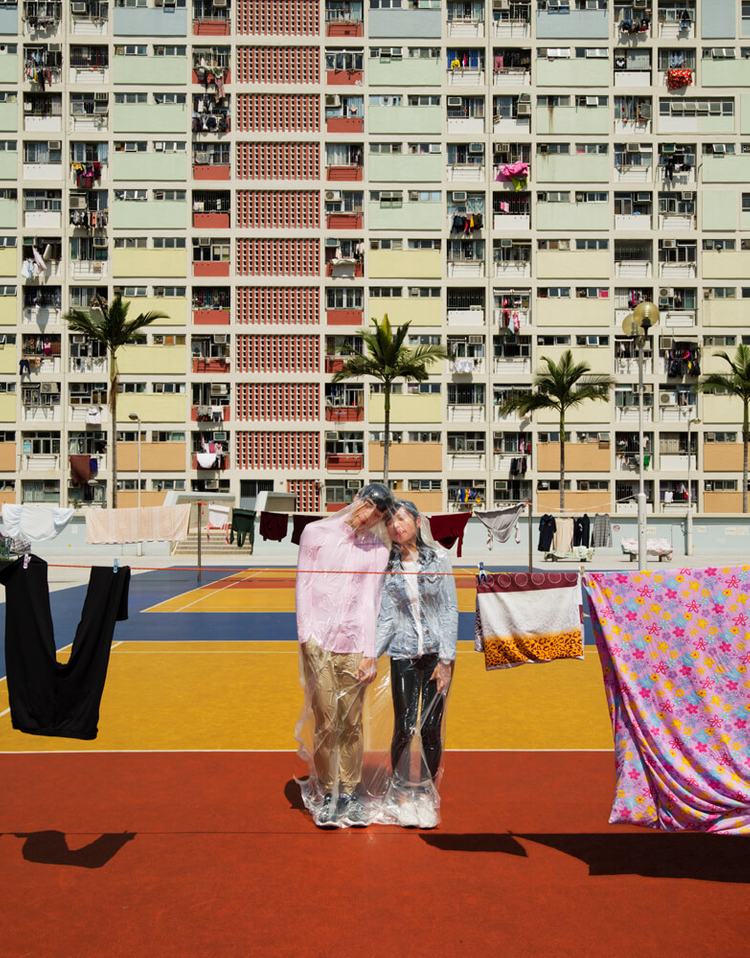Nicolien Janssens
Plastics

I am walking through the
supermarket, planning on making spring rolls for dinner. I put a cabbage
in my basket and reach for the carrots. “Shit,” I am thinking “they
come in a plastic bag”. Okay, no carrots then this time. I continue my
search for a head of lettuce. But there is no head of lettuce. There are
only pre-cut, plastic bags of lettuce. I start to feel anxious, am I
only going to put cabbage in my spring rolls? I decide to go for another
dish, gnocchi with eggplant and tomatoes. But apparently they have
decided to pack the eggplants in plastic from now on too. In frustration
I grab for the carrots and the lettuce I had earlier in my hands, I pay
and leave the supermarket, frustrated and angry with myself.
This feeling overwhelms me more and more often since my conversation with Maria Murcia Valderrama, in “How Bio is Bioplastic?” In this podcast, I talk with Maria about her research on bioplastics. About what plastic is, (apparently even rubber is!), about the differences between biodegradable and biobased plastic, the history and future of plastic.
Plastic, “a friend and an enemy”, that’s how I start the conversation. It is everywhere around us. As Maria says at one point, “think about your most joyful moments in life, definitely plastic was involved”. The plane that brings you to your holiday destination is made of plastic, the LP that carries your favourite song is made of plastic. Probably the sweater you are wearing contains plastic. But plastic not only makes life easier, it is part of our lives, part of the art I appreciate so much. The pictures surrounding this blog are made by Haruhiko Kawaguchi, and part of his project “Flesh Love”. By putting couples in a plastic bag, he removes all possible boundaries of space and air. Literally, because the plastic bag is a vacuum. In this way he aims to portray love “as it really is”. The result is breathtaking, I would say.
This feeling overwhelms me more and more often since my conversation with Maria Murcia Valderrama, in “How Bio is Bioplastic?” In this podcast, I talk with Maria about her research on bioplastics. About what plastic is, (apparently even rubber is!), about the differences between biodegradable and biobased plastic, the history and future of plastic.
Plastic, “a friend and an enemy”, that’s how I start the conversation. It is everywhere around us. As Maria says at one point, “think about your most joyful moments in life, definitely plastic was involved”. The plane that brings you to your holiday destination is made of plastic, the LP that carries your favourite song is made of plastic. Probably the sweater you are wearing contains plastic. But plastic not only makes life easier, it is part of our lives, part of the art I appreciate so much. The pictures surrounding this blog are made by Haruhiko Kawaguchi, and part of his project “Flesh Love”. By putting couples in a plastic bag, he removes all possible boundaries of space and air. Literally, because the plastic bag is a vacuum. In this way he aims to portray love “as it really is”. The result is breathtaking, I would say.

So we have love in plastic, but we are in love with plastic too. In the track “Plastik” of the album “Plastic Love”, Say Yes Dog sings “Everything is plastic, everything looks plastic”. Or as Four Tet and Kraak & Smaak say, we are “Plastic People”. All songs were for long part of my
playlist, yet I only realize now how many actually are about plastic. We
hear Berenice van Leer singing “You come over with the fakest smile. My
new best friend. [...] Something here is strange. The question remains:
how do you turn out the same? I can’t get away. They just talk in my
face. I need to replace. Plastic people.” It is as if plastic some
decades ago came to us as a friend with a fake smile. Now we are stuck
with the question: how do we replace plastic?
Listening to the podcast, it turns out that replacement is only part of the solution. Because yes, Maria develops bioplastics that won’t hurt the environment as much as normal plastics do. Yet, what struck me most in my conversation with Maria, is that Maria herself does not even see her research as the solution to the plastic problem. I asked Maria “would it have been better if all facemasks were made from bioplastics?” (because apparently, facemasks are made of plastic). I had simply assumed that she would say yes. But she didn’t. “If facemasks were made of bioplastics, people would even feel less guilty throwing their facemasks on the streets. Making facemasks out of bioplastics, might therefore only contribute to a wrong mindset. I do not want the public space to turn into landfilling spaces”. Maria makes better plastics, but not for people as an excuse to consume more. She makes better plastics for those cases where we actually benefit from the plastics, like Haruhiko’s pictures or the LP’s that we play over and over again. But not for the eggplant I buy, whose package I throw away as soon as I get home. It is for that reason that I feel guilty anytime I buy pre-packed greens, and why I, everyone, should go instead to their local greengrocer. Plastic is fantastic, but we have to use it right.
Listening to the podcast, it turns out that replacement is only part of the solution. Because yes, Maria develops bioplastics that won’t hurt the environment as much as normal plastics do. Yet, what struck me most in my conversation with Maria, is that Maria herself does not even see her research as the solution to the plastic problem. I asked Maria “would it have been better if all facemasks were made from bioplastics?” (because apparently, facemasks are made of plastic). I had simply assumed that she would say yes. But she didn’t. “If facemasks were made of bioplastics, people would even feel less guilty throwing their facemasks on the streets. Making facemasks out of bioplastics, might therefore only contribute to a wrong mindset. I do not want the public space to turn into landfilling spaces”. Maria makes better plastics, but not for people as an excuse to consume more. She makes better plastics for those cases where we actually benefit from the plastics, like Haruhiko’s pictures or the LP’s that we play over and over again. But not for the eggplant I buy, whose package I throw away as soon as I get home. It is for that reason that I feel guilty anytime I buy pre-packed greens, and why I, everyone, should go instead to their local greengrocer. Plastic is fantastic, but we have to use it right.


“It does not mean that we want to create more materials so that people can keep on comsuming them, because they think “oh well, it is going to degrate anyways”
